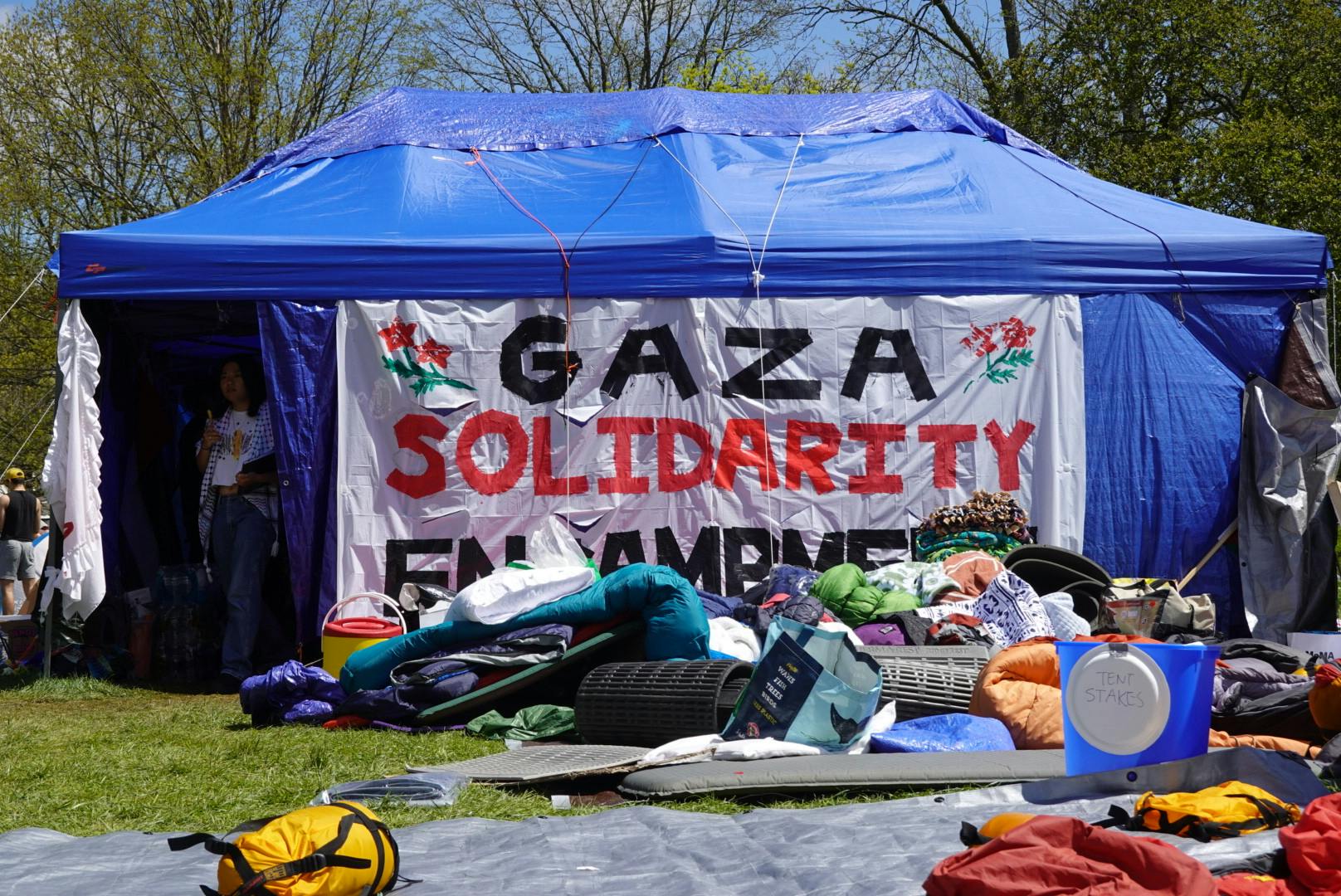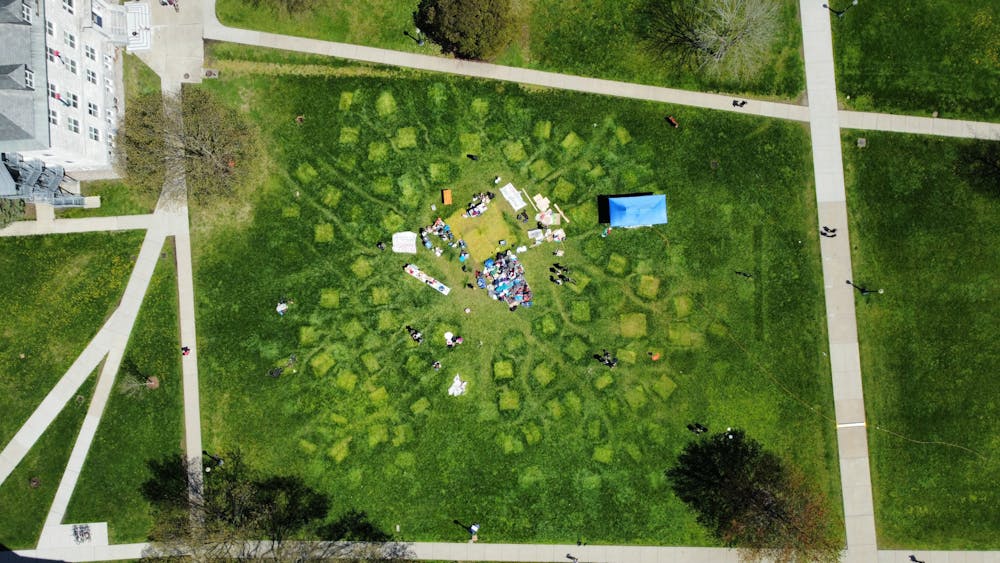At 11:45 a.m. on Monday, May 6, students began packing up their tents, putting an end to the seven-night Gaza Solidarity Encampment on McCullough lawn. Students voted this past weekend to end the encampment as soon as the administration released a statement, and did so immediately when President Laurie Patton sent an email outlining an agreement between the student protestors and administrators shortly before noon.
The college’s statement, titled “A Commitment to Common Educational Values,” called for an immediate ceasefire in Gaza. Otherwise, it did not use the specific language the protesters used in their five demands. Instead, it expressed the themes of every person’s right to pursue an education peacefully, the value of transparency in investing and financial communication, creating educational possibilities for those who are displaced or at risk and the value of celebrating Middlebury students with a safe graduation.
“We still disagree about many fundamental issues, but we share concerns for the devastating effects of the violence in Israel and Gaza on educational opportunity for all in the region,” Patton wrote in the email. “The document is future-oriented, outlining pathways for fruitful deliberation at Middlebury on the profoundly painful issues that the violence raises.”
After taking down the encampment, the protestors hosted a rally at 1 p.m. on McCullough Lawn, where patches of dead grass marked the spots their tents had occupied for a week. The organizers of the camp declared their efforts had succeeded in pressuring the administration — but added that there is still more work to be done — to a crowd of around 75 students.
“We are nowhere near done. Emails are commitments to change but not proof of tangible action,” a speaker told the crowd, going on to describe the task force and other areas of progress from the talks. “We will hold them to those promises.”
The five core demands the protestors outlined when they set up tents on Sunday, April 28 were divestment of Middlebury’s endowment from holdings in companies that profit from Israel’s military campaign; freedom of speech and protestor amnesty; an end to association with Israeli institutions and businesses; and cultivating association with Palestinian academic and cultural associations without a requirement that the college partner with Israeli counterparts as well.
The college’s statement called for an immediate ceasefire and end to the violence.
“We condemn unequivocally the killing of all innocent civilians in Gaza and Israel, where no civil society, including educational institutions, can continue in the midst of such destruction. Palestinians and Israelis cannot learn in an environment torn by war,” the college’s statement read.
“This may be a symbolic step, but it’s an important one,” a speaker said at the rally.
The college also confirmed that it is not currently invested in arms or arms manufacturers, and resolved to talk with trustees about sustaining and codifying not investing in armaments. The Board of Trustees will convene for its already scheduled meeting beginning this Friday, May 10. The college did not confirm whether its investment in arms and arms manufacturing will be addressed at the upcoming meeting. The statement pledged to share the details of the commitment and provide updates.
The college’s statement also addressed the value of educational exchange, but did not make explicit mention of cutting ties with the Israel Institute — one of the encampment’s most controversial demands.
“Together we will explore avenues to host all students in the region displaced by war and violence. We appreciate the encampment’s focus on the displacement of Gazan students,” the statement read.
The Faculty Council told the administration that it would be more beneficial for them to resolve the debate about the Israel Institute internally, which a spokesperson for the encampment, Josh Glucksman ’24.5, said is his preferred solution as well. He added that there are other professors who are funded similarly to the Israel Institute, through external programs and organizations.

The protestors began dismantling their encampment on McCullough Lawn on Monday morning following negotiations with the administration.
Those at the encampment also called for students to fill out the referendum sent by the Student Government Association (SGA) in solidarity with Gaza, which will close at 11:59 p.m. on Thursday, May 9. The form asks students four questions about their attitudes toward full financial transparency on investments, divesting the endowment of all holdings in companies engaged in arms manufacturing, divesting of holdings in companies that engage in war profiteering and divesting of holdings in companies that engage with any Israeli businesses.
According to SGA President Abed Abbas ’24, encampment leaders brought the referendum to the SGA midway through last week. Abbas and the other SGA senators worked with the protestors to revise and update the language of the referendum through Sunday night.
Abbas described his commitment to encouraging political engagement and activism at Middlebury.
“We are very proud of how activism has been over the last week, because we are all looking at other schools and Middlebury has just been unique in the reaction from students and the reaction from the administration. That’s something to look up to,” he told The Campus on Monday afternoon.
As of 3:45 p.m. on Monday, the referendum had received over 1,000 student responses. Abbas said he and the other SGA senators have committed to promoting the referendum for a couple of hours each day this week, and he hopes to reach 70 or 80% voter turnout by Thursday.
The protesters will bring the results to their meetings with trustees on Friday, May 10, they announced at the rally. Glucksman told The Campus he was grateful for the SGA’s willingness to work with them through the referendum process the past few days, and looks forward to continued action on their campaign when meeting with trustees.
“We will be the loudest, most belligerent, most unshakeable welcome team that the Board of Trustees will ever see. While they’re getting their coffee, idly discussing their summer plans in their Fortune 500 companies, we will be there. When they’re strolling across the crowd trying to enjoy Vermont spring air, we will be there,” Glucksman told The Campus. “We will be there right outside of their window, smiling.”
He added that the resolution on Monday held extra significance given it is Holocaust Remembrance Day.
“Standing against genocide is saying ‘never again for any people,’” Glucksman told the crowd.
The gathered students chanted a variety of other statements as well, including “Not another nickel, not another dime. No more money for Israel’s crimes” as well as “one solution, intifada revolution” and “From the river to the sea, Palestine will be free.”
A speaker added that the administration will also form a task force on campus dedicated to combating various forms of hatred including Islamophobia and anti-Arab and anti-Palestinian discrimination.
The statement and disbandment are a result of a series of meetings between negotiators and members of the administration. On Saturday, May 4, the encampment held a vote — open to anyone involved — to disband based on a rough outline of the anticipated administrative statement. An overwhelming majority voted to disband the physical encampment if the administration released a statement meeting the demands, according to Glucksman.
A meeting on Sunday, May 5 between students and the administration resulted in stronger wording on divestment and freedom of expression in the final statement.
On the outskirts of the gathering, closer to McCullough Student Center, stood a group of administrators from different areas of the college with varying levels of involvement in the recent negotiations. They stood and listened as the protestors ended the encampment while calling for continued action towards the referendum and momentum for their demands.
“Tents were only ever a symbol of our dedication. The righteous anger and fight for solidarity with Palestine continues. The encampment continues with each of us,” a speaker told the crowd.
Across the lawn outside of Voter and Munroe Halls stood at least one Public Safety officer. The encampment has previously spoken with Public Safety officers during their weeklong protest about which, if any, college policies the protest was violating.
A press release following the rally described the national context in which Middlebury’s protest exists amidst thousands of arrests at other universities across the country, sharing that the lack of police involvement was the “bare minimum” expectation for student safety.
“We recognize that negotiations between the Gaza Solidarity Encampment and Middlebury College took place in an atmosphere of relative calm,” the organizers wrote in the press release. “It is our hope that this sets a strong precedent for institutional responses to student activism now and in perpetuity.”
The campers are now dispersed around campus and plan to encourage students to vote in the referendum.
“We don’t have a plan except to continue putting pressure on them,” Glucksman told The Campus.

Katie Futterman '24 (she/her) is a Managing Editor.
Katie previously served as a News Editor and Staff Writer. This past summer, she was a news intern at Seven Days, and she held the same position at the Addison Independent the prior summer. In her free time, she loves to read, write, and bask in the sun.

Maggie Reynolds '24 (she/her) is the Editor in Chief.
Maggie previously served as the Senior Local Editor, a Local Section Editor, and a Staff Writer. She spent this past J-term interning for VTDigger, covering topics from affordable housing in Addison County to town government scandals. She also interned for Seven Days VT as an arts & culture reporter summer 2022 and as a news reporter for the Daily Gazette in Schenectady, NY summer 2021.
Maggie is majoring in History and minoring in Political Science and Spanish. She was a three-year member of the Women's Swimming and Diving team. Maggie enjoys running, hiking, and iced maple lattes.

Ryan McElroy '25 (he/him) is the Editor in Chief.
Ryan has previously served as a Managing Editor, News Editor and Staff Writer. He is majoring in history with a minor in art history. Outside of The Campus, he is co-captain of Middlebury Mock Trial and previously worked as Head Advising Fellow for Matriculate and a research assistant in the History department. Last summer Ryan interned as a global risk analyst at a bank in Charlotte, North Carolina.




